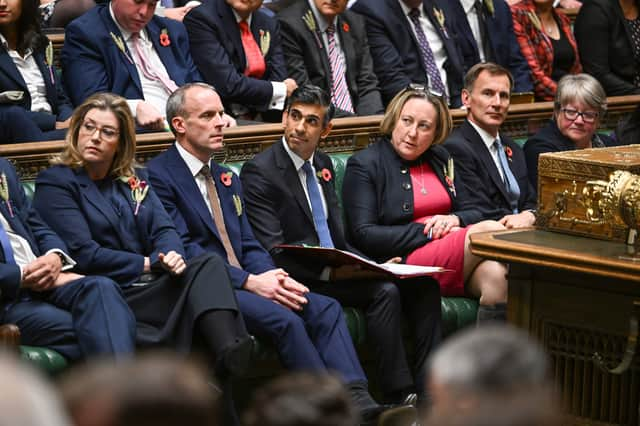What are MPs wearing on their lapels today? Why are politicians wearing wheat sheaves, what does it mean


Many would have tuned into PMQs to catch a glimpse of Prime Minister Rishi Sunak in action during his second session as Prime Minister.
The Sunak administration faced heated questions from the opposition on current topics such as immigration, and the Home Secretary’s email security breaches. But for eagle-eyed viewers, they would have also noticed an unusual accessory worn by hundreds of MPs.
Advertisement
Hide AdAdvertisement
Hide AdLabour leader Sir Keir Starmer, and Tory Cabinet members such as Penny Mordaunt and Dominic Raab were among those spotted sporting a wheat sheath on their outfit. The Prime Minister was one of the few Tory MPs to not wear the accessory.
But what was on the lapels of MPs? And what did it represent? Here’s everything you need to know about the awareness campaign.
Why were MPs wearing wheat?
The reasoning behind the wheat symbol is fairly simple. It is to represent Back British Farming Day, which aims to promote farming within the UK.
MPs took the opportunity to wear the wheat strands on their lapels in order to signal their support of the campaign, with the National Farmers’ Union (NFU) encouraging representatives to do so. The pin was also draped in wool, with this nodding towards livestock farming, and the wheat toward crop farming.
Advertisement
Hide AdAdvertisement
Hide AdMark Spencer, Minister of State at the Department for Environment, Food and Rural Affairs, said: “Farmers play such a crucial role as custodians of our countryside as well as growing and rearing great British produce for us all to enjoy. It’s been a challenging year in the fields, so on Back British Farming Day I encourage everyone to show their support.”
The NFU has urged the Prime Minister to invest and support the industry as he seeks to regrow the UK economy. Union president Minette Batters said: “As producers of the nation’s food – with world leading standards of animal welfare, as custodians of our working environment, and as an employer of 301,000 people – British farmers across the country will be celebrating Back British Farming Day.
“This year’s event comes at an extremely important time for British farming, and for the country. As the nation faces continued economic challenges, Prime Minister Rishi Sunak’s immediate priority will be to establish economic stability for the whole country.
“British food and farming is currently worth more than £120 billion to the nation’s economy, and we are an industry that wants to drive growth both in home markets and overseas.”
What is Back British Farming Day?
Advertisement
Hide AdAdvertisement
Hide AdBack British Farming day is held on 2 November. The awareness day is now in its seventh year.
As the years roll in, the campaign has moved to not only promote homegrown products, but also mark key changes to the industry. This includes a rise in awareness of carbon-neutral and climate friendly farming.
MPs have worn the wheat and wool symbols in the past, however the campaign has grown year-on-year, with more politicians and prominent figures backing UK-made produce. Social media campaigns are also used to spread awareness of the day, with farming unions and individual farmers taking the opportunity to share their contribution to the industry.
The 2022 edition of the campaign day was originally due to take place on 14 September. However, the NFU announced that the awareness day would be pushed back until November as a mark of respect to Queen Elizabeth II, who died six days before the day was due to take place.
Comment Guidelines
National World encourages reader discussion on our stories. User feedback, insights and back-and-forth exchanges add a rich layer of context to reporting. Please review our Community Guidelines before commenting.
